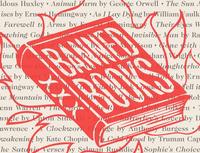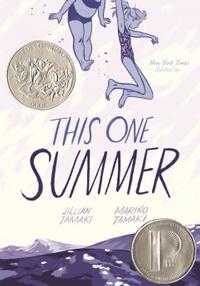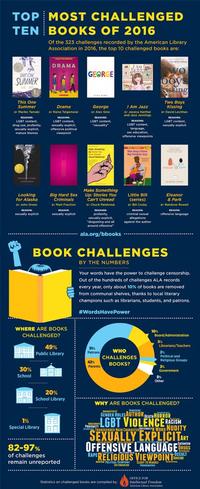It is National Library Week! First sponsored in 1958, it is a time to celebrate the contributions of our nation's libraries and librarians and to promote library use and support. It is also a time for the library community to look at its role in our 21st-century society. To that end, today the American Library Association (ALA) released the State of America’s Libraries Report 2017.
Libraries can open up a diverse world of books and programs for readers of all ages—but sometimes some works within this world ruffle feathers. A notable part of the State of Libraries Report is the Top Ten Most Challenged Books of 2016, compiled from analysis by the ALA’s Office for Intellectual Freedom (OIF). Out of 323 challenges recorded by the OIF, the most challenged books of 2016 were:
- This One Summer, written by Mariko Tamaki and illustrated by Jillian Tamaki
Reasons: LGBT characters, drug use, profanity, sexually explicit, mature themes
- Drama, written and illustrated by Raina Telgemeier
Reasons: LGBT characters, sexually explicit, an offensive political viewpoint
- George, written by Alex Gino
Reasons: includes a transgender child; the “sexuality was not appropriate at elementary levels”
- I Am Jazz*, written by Jessica Herthel and Jazz Jennings, and illustrated by Shelagh McNicholas
Reasons: portrays a transgender child, language, sex education, offensive viewpoints
- Two Boys Kissing*, written by David Levithan
Reasons: cover image of two boys kissing, sexually explicit LGBT content
- Looking for Alaska*, written by John Green
Reasons: sexually explicit scene that may lead a student to “sexual experimentation”
- Big Hard Sex Criminals, written by Matt Fraction and illustrated by Chip Zdarsky
Reason: sexually explicit
- Make Something Up: Stories You Can’t Unread, written by Chuck Palahniuk
Reasons: profanity, sexual explicitness, being “disgusting and all around offensive”
- Little Bill (series) written by Bill Cosby and illustrated by Varnette P. Honeywood
Reason: criminal sexual allegations against the author
- Eleanor & Park, written by Rainbow Rowell
Reason: offensive language
(* denotes a book that was also on the most-challenged list last year)
Check out this video of the Top Ten Challenged Books of 2016, made by the ALA.
The ALA website explains, “Books usually are challenged with the best intentions—to protect others, frequently children, from difficult ideas and information.” Often these challenges occur at the local level, with a group attempting to remove material from the school curriculum or library. Sometimes, such challenges reach higher levels, resulting in court cases and proposed legislation.
When a school board in Arkansas voted to restrict students’ access to the Harry Potter books, because of concern about exposure to witchcraft and disrespect for authority, a district court overturned the decision in the 2003 case Counts v. Cedarville School District. In 2016, Virginia Governor Terry McAuliffe vetoed a bill that would allow parents to block their children from reading assigned books that contain sexually explicit material. The book at the center of the debate was Toni Morrison’s Pulitzer Prize-winning Beloved, a story of an escaped slave that includes scenes of sexual violence that white masters perpetrated against their black female slaves.
In 1982, a complaint to a New York school board about certain books on school library shelves—including Slaughterhouse Five and Best Short Stories of Negro Writers—reached the Supreme Court. In Island Trees School District v. Pico, the Court ruled that a public school cannot remove books from the school library because its staff or community members disagree with the content. (The ruling did permit, however, the removal of books with content deemed “inappropriate” for the children of the school, e.g., books with sexual content in an elementary school.)
The ALA has found that authors of color, as well as books with diverse content, are disproportionately challenged and banned.
Citing sources from John Stuart Mill to Supreme Court Justice William J. Brennan, Jr., the ALA holds a position promoting “the freedom to choose or the freedom to express one's opinions even if that opinion might be considered unorthodox or unpopular, and stresses the importance of ensuring the availability of those viewpoints to all who wish to read them.”
Read on, Library lovers!
Have a question for Free Library staff? Please submit it to our Ask a Librarian page and receive a response within two business days.



